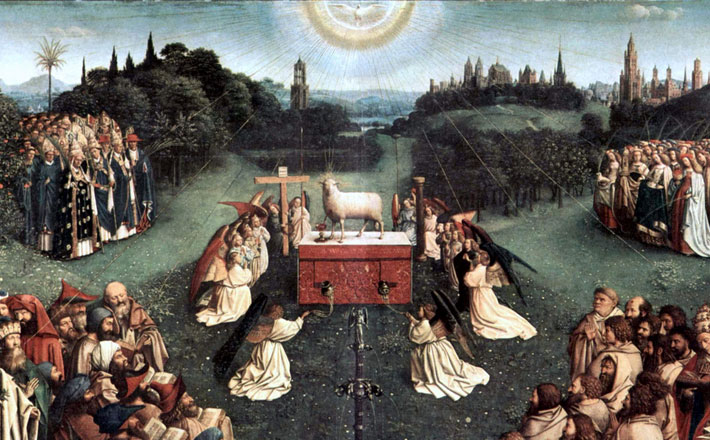Commentary on Matthew 5:1-12
What does it mean to be happy? This question is central to individuals yearning for fulfillment.
For centuries, it has also been a key question in philosophical debates about the meaning of human life. Ancient Greek philosophers debated how humans could align their own will with the created order in order to be happy or blessed, makarios.
The Greek word, makarios, which is central to the Beatitudes, is a fairly common word. It’s not really hard to understand, but it’s difficult to translate into English. The New Revised Standard Version (NRSV) translates “blessed,” which is by far the most common translation of the Beatitudes. The problem with blessed is that it sounds a little unreal, like a quality that applies only to those saints whose stories we celebrate on All Saints Day and whose example may appear a bit unattainable to us.
New Testament professor Margaret Aymer has translated makarios as “greatly honored.” This is another good option for translating this word because it emphasizes the theme of reversal that is implied in the Beatitudes. The meek and the merciful are not revered by the world’s standards, but they are honored by God and by those who would align their lives with God’s ways.
But there is another option for translating makarios that we may consider: happy. Jesus says: Happy are the poor in spirit. Happy are the merciful. Happy are the pure in heart.
“Happy” is not a perfect translation, because in our culture it can convey a thin, happy-go-lucky kind of happy. This is not what ancient philosophers meant, for they were well aware of the suffering and conflict humans experience. It cannot be what Jesus means either, or he would not call those who mourn “happy.” He is describing a deeper happiness, the kind of happiness that only comes from aligning one’s own will with God’s.
When this same word is used in the Old Testament, that’s exactly how we translate it: “happy.” Consider Psalm 1: “Happy are those who do not follow the advice of the wicked, or take the path that sinners tread, or sit in the seat of scoffers; but their delight is in the law of the Lord, and on God’s law they meditate day and night.” The psalmists declare “happy” those who delight in the law (Psalm 1:1), those who take refuge in God (Psalms 2:12; 34:8), those who observe justice and practice righteousness (Psalm 106:3).
Now, the psalmists are quite aware that the wicked pick on, persecute, and scorn the righteous. So this “happiness” cannot be a simple feeling that things are going well, or that one is well-liked. These people are happy because they live their lives in a way that is oriented toward God’s loving-kindness. They see the world the way God sees it.
Matthew is saying the same thing. Those who long to follow God’s word, who seek the righteousness, holiness, and justice of God, are “happy.” Other people may appear happy outwardly. They may be successful in the world’s terms. They may have expensive shoes and a matching handbag. They may send their children to the best schools. But that is not real happiness, for it does not reflect the things that are important to God.
The word “happy” focuses our emphasis on the present state of the people that are discussed here. While blessedness can sound like a future promise of good things to those who suffer now, “happiness” makes sense as something people strive for in this lifetime. Although they experience difficulty of many kinds, Jesus attributes a present-tense state of happiness to those he describes.
Of course there is a future element to these biblical statements about happiness. The psalmists knew that sometimes God’s deliverance is not immediate. Sometimes the wicked prosper. The wealthy exploit the poor. The innocent are convicted and imprisoned and killed. The psalmists also knew this, and still they affirm that “the Lord watches over the way of the righteous, but the way of the wicked will perish” (Psalm 1:6). God sees the actions of the wicked, and God listens to the cries of the poor. In the fullness of time, God will establish justice.
Compared to the Psalms, Matthew has turned up the volume regarding the future promised to those who live according to God’s ways. In Matthew 5, each of the verses 4-9 makes a statement about the future: for example happy are the meek, for they will inherit the earth. The present tense in the first clause suggests that the meek are happy now, but they are happy in part because they see the big picture. They live in the knowledge that the appearances of the world do not correspond to the ultimate realities of God’s kingdom. Their inheritance is secure.
This does not mean that the happy cease to care about the world. After all, the Beatitudes are the introduction to the Sermon on the Mount. Jesus goes on in the Sermon to say a lot about life in this world. He starts with the commandments, naming explicitly “You shall not murder” (Matthew 5:21) and “You shall not commit adultery” (Matthew 5:27). He goes on to other difficult teachings, like turning the other cheek and loving enemies. These teachings give depth to what it means to be meek, to be a peacemaker, to be pure in heart. Happiness is not simply a way of seeing the world as God sees. It is a way of life. It motivates moral behavior and deep humility. It moves people to seek justice and to love mercy.
It is difficult to contemplate the brokenness of the world, and even more difficult to know ourselves to be complicit in its injustices. But happiness is never something that can be found without that knowledge. We can never be happy in the sense Matthew means by ignoring or downplaying the suffering of others. This is the paradox of happiness: it sits face to face with the pain of injustice, sickness, and death. Yet it is still somehow strangely appropriate to use the word “happy.”


November 5, 2017